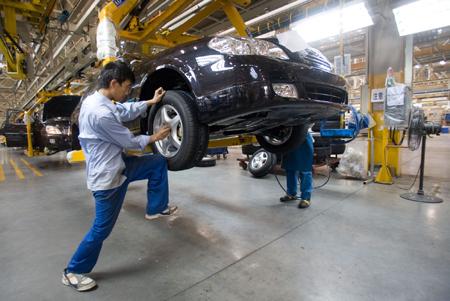
Chinese workers assemble a Chery sedan on an assembly line in the Chery Automotive Co Ltd factory in Wuhu, Anhui province. Manufacturing activity in China edged down to 53.9 in December from November's 55.2.[Photo/Bloomberg News]
Strong economic tightening looks less likely as factory activities easeBEIJING - China's factory inflation cooled in December as manufacturers expanded more slowly after a strong run in growth, lessening the need for the country's central bank to tighten monetary policy too far.
The official Chinese purchasing managers' index (PMI) edged down to 53.9 in December from November's 55.2, falling short of a median forecast of 55.5 in a Reuters poll of 12 economists.
The results of the survey of 820 firms will likely be welcomed by China's central bank by showing the world's second-largest economy was still growing solidly despite the slight pull-back in activity.
More importantly, they held out hope that China's inflation, running at its highest in over two years, may be peaking soon.
That should calm investors who are worried that accelerating inflation will lead China to aggressively tighten policy and hurt growth in the world's fastest-growing major economy.
"Growth is not overheated, (and) the chance for inflation to be out of control is low," said Ting Lu, an economist at the Bank of America-Merrill Lynch in Hong Kong.
"Policy will be tightened, but don't expect excessive measures."
The input cost sub-index in the official index fell to 66.7 in December from 73.5 the previous month, posting the biggest decline among all sub-indices.
Although that is still well above the 50-point level that demarcates expansion from contraction, it showed prices were rising at a slower pace.
Previously, accelerating inflation and record house prices have led China's central bank to signal time and again in recent months that the country needs "prudent" monetary policy to curb price pressures and prevent asset bubbles.
To match its tough rhetoric with deeds, the central bank raised interest rates on Dec 25 for the second time in just over two months. Market consensus is that it will increase rates twice more in the first half of 2011.
For some, that China can tighten policy at a time when the US economy is still battling near-10 percent unemployment is a sign of the Chinese economy's strength.
Zhang Liqun, a researcher at the China Federation of Logistics and Purchasing, which compiles the PMI on behalf of the National Bureau of Statistics, said as much.
"The growth of industrial output for November increased a little from the previous month, while export and investment rose strongly. So from this, it is not apparent that the economy is in a downward trend," Zhang said.
But Zhang noted that a slowdown in new orders bears watching. The new orders sub-index dropped to 55.4 in December, from November's 58.3.
Inflation in China raced to a 28-month high of 5.1 percent in November and that has stirred worries among the populace.
Anxiety over China's policy outlook in the face of rising prices has unsettled some investors and taken a toll on Shanghai's share index. It lost 14 percent in 2010, ranking it one of the worst performers in the world for the year.
Worries about rising inflation have led the Chinese government to signal repeatedly in recent weeks that the task of reining in prices is among its top priorities for 2011.
The People's Bank of China, the central bank, has fallen in line with the policy goal.
Recent public commentary from the bank suggested it is ready to use a range of tools to curb prices and excess cash, seen as the main driver of inflation.
Measures the central bank said could be taken include further increasing reserve requirements on a differentiated scale, depending on the size of the bank, as well as lifting deposit rates to drain excess cash from the system.
Some investors have also speculated it may allow the yuan to rise at a faster clip to tame imported inflation.
Reuters





